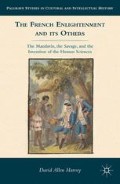Abstract
French Enlightenment interest in the non-European world was not confined to Asia and the Americas. As Enlightenment thinkers sought to elaborate a new universal science of man, they supported their competing theories with a wide range of examples, drawing not only upon Greco-Roman antiquity and contemporary Europe, but also upon travel narratives from distant lands. They recognized, however, that much of the available information regarding the peoples of these remote regions was unreliable. The medieval belief that distant countries were populated by monstrous races such as cyclopses and dog-headed men had not completely dissipated, and even in the eighteenth century, serious scholars debated whether there existed giants in Patagonia or men with tails in the Philippines. In a footnote to the 1755 Discourse on the Origins of Inequality, Rousseau wrote:
We know nothing of the peoples of the East Indies, who have been frequented solely by Europeans more desirous to fill their purses than their heads. All of Africa and its numerous inhabitants, as distinctive in character as in color, are still to be examined; the whole earth is covered by nations of which we know only the names—yet we dabble in judging the human race! Let us suppose a Montesquieu, Buffon, Diderot, Duclos, d’Alembert, Condillac, or men of that stamp traveling in order to inform their compatriots, observing and describing, as they know how, Turkey, Egypt, Barbary, the empire of Morocco, Guinea, the land of the Bantus, the interior of Africa and its eastern coasts, the Malabars, Mogul, the banks of the Ganges, the kingdoms of Siam, Pegu, and Ava, China, Tartary, and especially Japan; then, in the other hemisphere, Mexico, Peru, Chile, the straits of Magellan, not forgetting the Patagonias true or false, Tucuman, Paraguay if possible, Brazil, finally the Caribbean islands, Florida, and all the savage countries: the most important voyage of all and the one that must be undertaken with the greatest care. Let us suppose that these new Hercules, back from these memorable expeditions, then at leisure wrote the natural, moral, and political history of what they would have seen; we ourselves would see a new world come from their pens, and we would thus learn to know our own.1
Access this chapter
Tax calculation will be finalised at checkout
Purchases are for personal use only
Preview
Unable to display preview. Download preview PDF.
Notes
Jean-Jacques Rousseau, “Discourse on the Origins of Inequality” [1755], in The First and Second Discourses, trans. and ed. Roger D. Masters (Boston, MA: Bedford St. Martin’s, 1964), 212–213.
For more information on Maupertuis’s remarkable life and scientific career, see Mary Terrall, The Man Who Flattened the Earth: Maupertuis and the Sciences in the Enlightenment (Chicago, IL: University of Chicago Press, 2002).
Madeleine V. David, “Le Président de Brosses historien des religions et philosophe,” in Charles de Brosses, 1777–1977 : Actes du colloque organisé à Dijon du 3 au 7 mail 1977, ed., Jean-Claude Garreta (Geneva: Slatkine, 1981), 129.
Louis-Antoine de Bougainville, Voyage autour du monde (1771; repr., Paris: Gallimard, 1982), 225–6. For a brief biographical sketch of Louis-Antoine de Bougainville, see the introduction to this edition by Jacques Proust.
Matt Matsuda, Empire of Love: Histories of France and the Pacific (Oxford and New York: Oxford University Press, 2005).
Harry Liebersohn, The Travelers’ World: Europe to the Pacific (Cambridge, MA: Harvard University Press, 2006), 86.
P. J. Marshall and Glyndwr Williams, The Great Map of Mankind: Perceptions of New Worlds in the Age of Enlightenment (Cambridge, MA: Harvard University Press, 1982), 259.
Bougainville, Voyage, 259, 257. 28. Louis-Antoine de Bougainville, Écrits sur le Canada : Mémoires-Journal-Lettres, ed. Etienne Taillemite (Sillery: Septentrion, 2003), 93.
Denis Diderot, “Supplement to the Voyage of Bougainville” [1772], in Diderot: Political Writings, trans. and ed., John Hope Mason and Robert Wokler (Cambridge: Cambridge University Press, 1992), 42.
Larry Wolff, “Discovering Cultural Perspective: The Intellectual History of Anthropological Thought in the Age of Enlightenment,” in The Anthropology of the Enlightenment, ed., Larry Wolff and Marco Cipolloni, The Anthropology of the Enlightenment (Stanford, CA: Stanford University Press, 2007), 22.
Claudia Moscovici, “An Ethics of Cultural Exchange: Diderot’s Supplément au Voyage de Bougainville,” Clio 30:3 (2001), 290, 307.
Tzvetan Todorov, On Human Diversity: Nationalism, Racism, and Exoticism in French Thought (Cambridge, MA: Harvard University Press, 1993), 280.
Cited in Sankar Muthu, Enlightenment against Empire (Princeton, NJ: Princeton University Press, 2003), 149.
Cited in Jordan Kellman, Discovery and Enlightenment at Sea: Maritime Exploration and Observation in the Eighteenth-Century French Scientific Community (Princeton University Dissertation, 1998), 408.
Daniel Headrick, The Tools of Empire: Technology and European Imperialism in the Nineteenth Century (Oxford: Oxford University Press, 1981).
Michel Adanson, Voyage au Sénégal, ed. Denis Reynaud and Jean Schmidt (1757; repr., Saint-Etienne: Publications de l’Université de Saint-Etienne, 1996), 44.
Biographical information taken from Auguste Chevalier, Michel Adanson: Voyageur, naturaliste, et philosophe (Paris: Larose, 1934).
On Adanson’s contribution to the fields of natural history and biology, see Robert Huxley, ed., The Great Naturalists (London: Thames & Hudson, 2007), 153–158
David Diop, “La mise à l’épreuve d’un régime de véridiction sur’la paresse et la négligence des Nègres’ dans le Voyage au Sénégal d’Adanson,” in L’Afrique du siècle des Lumières : savoirs et représentations, ed. Catherine Gallouët et. al. (Oxford: Voltaire Foundation, 2009), 22.
David Bindman, Ape to Apollo: Aesthetics and the Idea of Race in the Eighteenth Century (Ithaca, NY: Cornell University Press, 2002).
Copyright information
© 2012 David Allen Harvey
About this chapter
Cite this chapter
Harvey, D.A. (2012). The Last Frontiers. In: The French Enlightenment and Its Others. Palgrave Studies in Cultural and Intellectual History. Palgrave Macmillan, New York. https://doi.org/10.1057/9781137002549_5
Download citation
DOI: https://doi.org/10.1057/9781137002549_5
Publisher Name: Palgrave Macmillan, New York
Print ISBN: 978-1-349-43381-0
Online ISBN: 978-1-137-00254-9
eBook Packages: Palgrave History CollectionHistory (R0)

